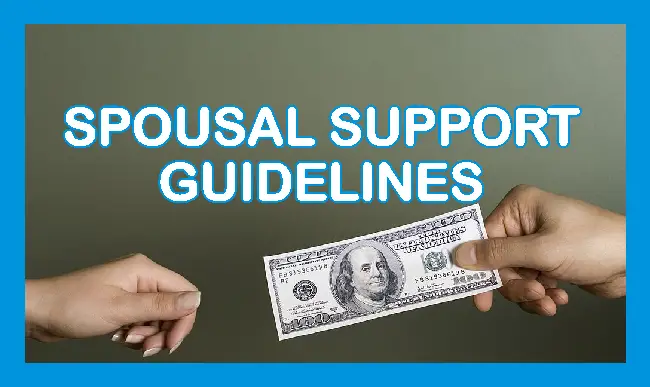
Alimony has evolved over generations. What started off as the man providing financial support for the woman in the event of separation or divorce has metamorphosed into the spouse with a better financial status being the provider of the support instead, no matter the sex.
Many people still want to know why alimony is a thing in the US despite the fact that both spouses are expected to work and earn wages.
In this comprehensive overview of spousal support, we will be dissecting every inch of information you may have regarding the topic. This is the most comprehensive article on spousal support you can get. Read on.
Spousal Support Meaning
One of the first questions people ask after a divorce is “what is alimony?”. To dissect what’s alimony, we have to start with the definition.
Alimony (also known as spousal support in the U.S. and Canada; spousal maintenance in Canada, England, New Zealand, Ireland, Northern Ireland, and Wales; spouse maintenance in Australia, and aliment in Scotland) is a legal financial obligation a person provides to the spouse to enable them to sustain themselves before, during, or after a divorce or separation.
Understand that in most jurisdictions, alimony is quite different from child support, which essentially is financial support contributed after a divorce by one parent to the other parent or guardian of any child born during a marriage or union.
The obligatory status is derived from the family law or particularly divorce law operated in the country, province, or state.
History of Spousal Maintenance

History of Spousal Maintenance
The word alimony originated from the Latin word alimōnia (“to nourish”), which essentially relates to the term ” aliment” (a Scots Law about sustenance to assure the wife’s food, clothing, lodging, and other necessities after a divorce).
It is contained in the 1754 BC Code of Hammurabi, which is a Babylonian legal statute, seen as the best-organized, longest, and best-preserved legal text from the ancient Near East.
The code states that the woman who has children must receive sustenance from a man which she will use to take care of the children. As can be seen, the idea of Spousal Maintenance clearly started off as child support, which only applied to women who bore children for their husbands. But it has since evolved.
Why Does Alimony Exist?
To understand why alimony is a thing, you have to understand why alimony exists in the first instance.
Alimony, in its broadest definition, is intended to compensate for the economic consequences of a divorce. The court recognizes that divorce may be significantly more difficult for one spouse than the other. As a result, it can arrange for payments to be made in a timely manner to avoid financial difficulty.
Because one spouse often gives up all earning potential in order to raise a family and support their partner’s job, and when they divorce, the “starting point” for a new career isn’t quite enough to keep their living standards or make a decent living.
That being said, alimony is no longer seen as punitive or “just/equal” in many parts of the country (regulations vary by state and even by the judge), and is instead ordered only in the amount that the lesser-earning spouse can make ends meet, and even then only in the amount that the higher-earning partner can afford, and only for a specified period.
Evolution of Alimony
Over the decades, specifically in the Middle Ages, alimony evolved into what we have today following the English ecclesiastical courts which, were spiritual courts that had wider jurisdictions than just religious matters.
These courts awarded Spousal Maintenance in cases of divorce and separation. The different types of spousal maintenance awarded then include:
Alimony pendente lite was awarded to support the wife during a marriage that still continued. It was seen as the duty of the husband to do so.
Permanent alimony or post-divorce was similar to a legal separation today, assuming that the marriage continued, and the duty of the husband to support his wife remained intact. The law sees that divorce did not end a marriage.
As the 19th century ushered in, divorce laws also evolved and shifted to alimony payment based on faults. This means that spousal support payment was hinged on the faults that lead to the divorce.
So if it was determined that the wife was infidel, which lead to the divorce, the alimony would not be awarded. Yet, this is not the only reason why alimony is a thing.
Alimony Check

Alimony Check
After a divorce, one spouse pays the other an amount as stipulated by the alimony order as determined by a judge (or an amount agreed by both parties). This is known as an alimony check, and it’s intended to enable the recipient to support themselves and/or their children.
The check is paid by the spouse that used to be the main breadwinner of the family with the higher income, to the one with lower or no income. This is the major reason why people ask why is alimony a thing.
How to Calculate Spousal Support
There is no stipulated formula for calculating spousal support in all the 50 states of America. Different states have different methods of calculating alimony, although most state statutes give the judges the full powers to calculate alimony on case-by-case bases.
The courts in reaching an amount, take different circumstances into consideration, from where they base the alimony type and amount to be awarded.
What is Spousal Support Based on?
Before deciding on spousal support, judges take many factors into consideration. But one common factor across all states and types of state alimony laws is that the spouse that earns more is usually the one that pays alimony.
However, other factors also come into play, including:
- how long the marriage lasted
- the monthly income of both spouses
- the expected monthly expenses of both spouses
would any of the spouses suffer if they are made to pay support to the other - and other vital issues.
To get a complete list of the factors and why alimony is a thing., check out this article about what it’s based on.
Spousal Support Based on Fault and No-Fault Divorce
But as the income of husbands grew, meaning they could afford to pay spousal maintenance, the award also increased, as the wives could also show the need to be supported financially. This gave birth to the no-fault alimony system, which essentially paid less emphasis on the fault that lead to the breakup or divorce.
From mostly being a woman/man thing, the US Supreme court ruled that alimony should become gender-neutral in the 1970s. This gave room for men to also receive support. The person to receive was now determined by checking who has the higher income.
Difference Between Spousal Support and Alimony
Really, there is no specific difference between spousal support and alimony. The two terms are one and the same. However, spousal support is a more recent term while alimony is an older term literally meaning the ex-spouse maintaining the former partner’s lifestyle after a divorce.

Difference Between Spousal Support and Alimony
Also, spousal support which is growing in popularity despite meaning the same thing as alimony is more gender-neutral, as it does not in any way imply payment to any particular sex. It simply concentrates on maintenance payments from one spouse to the other after marriage.
Alimony vs Child Support
The two terms refer to two separate issues regarding payments made for the upkeep. While child support is basically the contribution made to the parent or guardian who is in charge of children born in a now broken marriage.
However, when people want to know why is alimony a thing, they need to understand that spousal support refers to the payment made by a spouse to support the other spouse after a divorce.
Though Alimony started off as a law that looks much like child support, it has been clearly differentiated over time, and the specifics of both have been well spelled out
Types of Spousal Support
Essentially, there are four types of support. Every jurisdiction adopts one or more of these for implementation. These include:
Permanent Alimony
This is the support received by the lesser-earning spouse until the death of the recipient, the payor, or when the recipient remarries.
Rehabilitative Alimony
The support is given for a period of time to a lesser-earning spouse, to acquire work or skills necessary for work and become self-sufficient outside the home.
Temporary Alimony
This type of support is ordered when the parties are separated prior to divorce. It is to support the recipient while the divorce process is ongoing.
Reimbursement Alimony
The support is awarded as a kind of reimbursement for the expenses borne by a spouse to support the other spouse while the marriage lasted for things like job skills acquisition, educational expenses, etc.
Lump-sum Alimony
When one spouse does not desire any property or valuable items from their marital assets, lump-sum alimony is ordered in lieu of a property settlement.
Who Pays Alimony?
Spousal support is usually paid by the spouse who has been sustaining the other spouse and has a greater income. A judge must consider various variables in each instance when deciding whether spousal support should be paid.
In some circumstances, the realities of how your assets were divided will determine who pays alimony. It isn’t necessarily a question of who makes more money. If the other spouse has more assets, alimony may be paid to the working ex-spouse with fewer assets.
To understand who pays alimony, you have to understand the term “the standard of living of the marriage” is one of the fundamental criteria the law examines when determining who pays alimony.
If you are unemployed or make significantly less money than your spouse, you should evaluate if you could maintain the standard of living you enjoyed while married. If otherwise, how much money would you need to maintain such a lifestyle?
Payor’s Ability to Pay
The spouse who earned the majority of the money while the relationship lasted, would most likely have to share the money with his or her ex-partner. If you don’t, your quality of life would increase much above that of your spouse, while his or hers would fall below it.
Even as the law requires the higher-earning spouse to be the one who pays alimony, this however is limited to the extent that they are able to, taking into account the need to provide for your ex-spouse’s health, education, work experience, housing, and other needs, within your ability.
While the underlying concept behind alimony is that if your marriage ends, you should both be able to continue living as you did before the split, it also recognizes that both of you should partake in the fall in your standard of living.
How Does Alimony Work?
Alimony payments are usually made on a monthly basis by one spouse to another spouse. It may be ordered by a judge as a lump sum either in cash or asset transfer (which is different from the ordinary procedure of splitting the couple’s assets).
Alimony starts before, during, or after a divorce. The first step may involve the couple reaching an agreement by themselves on who pays and how it’s paid.
Where they are unable to come to an agreement or where acrimony leads to the divorce, they may involve a mediator. Where this is also not possible, both may have to appear before a judge with their alimony attorney for adjudication.
Whichever or whoever leads to the alimony agreement, it is usually written down and signed to avoid future disagreements. When a judge had to decide, they usually take certain issues into consideration before coming to a decision.
In almost all cases, the spouse with the higher income is made to pay the support to the spouse with a lesser income.
States That Enforce Spousal Support
 In the United States, spousal support is enforced in all 50 states. However, the type of spousal support is determined by state laws. Different states employ their own laws. States that enforce spousal support are known as alimony states.
In the United States, spousal support is enforced in all 50 states. However, the type of spousal support is determined by state laws. Different states employ their own laws. States that enforce spousal support are known as alimony states.
Permanent alimony is specifically reserved for spouses with disability or illness, using the duration of the marriage to determine in most states, So, basically, you can request spousal support no matter the state you reside in.
We have compiled the alimony laws as it obtains in all the 50 states plus Washington DC. Click here for complete details of spousal support laws for all states.
Interstate Spousal Support Enforcement
Its imperative to state that while alimony laws are defined by state laws, there is the special federal alimony law that comes into effect for instances where one of the ex-spouses moves to a different state with a different law.
Known as the Uniform Interstate Family Support Act, it stipulates how a spousal support recipient should register the order in the state where the payer resides.
Usually, after the proper registration, the alimony would can then be enforceable as though it originated from the order of that state.
How Spousal Support is Paid
In most cases, alimony is paid periodically, mostly monthly. But in some cases, it could be ordered to be paid as a lump sum to the recipient. This could be by means of property transfer or cash payment.
The payer may request a change of payment methods that cannot be undone, like the lump sum. Also, the periodic alimony payment can be ended where the initial agreement or court order was not specific against its modification. This is dependent on the payer’s ability to convince the judge based on circumstances.
How Periodic Aliment is Stopped or Reduced
While a lump sum of Spousal Support cannot be undone once paid, there are circumstances that can lead to the stoppage or reduction of periodic Spousal Maintenance on request. These are dependent on the alimony laws of the state or province and the ability of the applicant to convince the judge. They can include:
- the death of either spouse
- the supported spouse remarries
- the supported spouse moves in with a new partner
How Long Spousal Support Lasts

How Long Spousal Support Lasts
Alimony payment averagely lasts between 60 to 70% of the duration of the marriage, depending on specific details used by the judge in determining the order.
So assuming the marriage lasted for 10 years, then the alimony payment will most likely be ordered to be paid for another 6 to 7 years to the spouse with no or little income.
Want to know specifics about the duration of ailment? Then check out our article on how long you have to pay.
When to Request Spousal Maintenance
A spousal support request is normally included in the divorce paperwork (filing or responding to the petition by the spouse). Where both spouses or mediator is unable to reach an acceptable agreement, then a motion will be formally filed to a court requesting to adjudicate on the spousal maintenance.
Next, the court fixes a hearing for the spouses will appear and state their claims and counterclaims with evidence if any. After consideration of everything, the judge reaches a judgment and an order is issued.
However, if for any reason, neither spouse included a request for alimony during their divorce processes, either of them can approach the courts later and request for it.
How to Avoid Spousal Support
The spouse paying Spousal Support can avoid or stop the spousal maintenance payment if he/she is able to prove a genuine reason to the judge. Here are some reasons that may lead to the stoppage of payment:
- that the dependent spouse is guilty of infidelity
- the spouse remarries and has to take care of the new spouse however, he/she will continue paying the child support for children if any
- the spouse proves that he has no source of income
- if the spouse is disabled and unable to earn a living
How to Enforce Defaulting Aliment Awards
In cases where a former spouse in not or stopped paying spousal support, that was ordered by a court, the recipient may approach the court again for enforcement. This also applies when an agreement was reached by the now-divorced or separated couple by themselves but a disagreement erupted.
In any case, the alimony recipient seeking enforcement will file a “show cause” motion, The court then fixes a hearing for determination of why the spouse stopped the payment.
Depending on the judgment, the family courts possess different methods of spousal maintenance enforcement. It could order additional fines and penalties to the defaulting spouse, including paying the backlog of payments.
Spousal Support Taxation and Reporting
Spousal Support payer can choose to deduct payment for federal income tax returns. Starting from 2019, alimony payers may no longer deduct these payments.
Also, the recipient is expected to report the received alimony as an income. Also starting from 2019, the recipient doesn’t have to report the Spousal Maintenance as an income. In both cases, the old rules still apply to divorces settled before 2019.
However, note that while these are federal statutes, some states still require alimony recipients to report such as an income while filing their state tax returns, while the payer can still deduct the stipulated amounts on their returns.
How Courts Decide Spousal Support

How Courts Decide Spousal Support
In ordering the spousal support amounts, for rehabilitative and permanent support, the courts consider different issues and factors. These include:
The courts mostly rely on the principle of the standard of living of the marriage, which stipulates that after the marriage breakup, both spouses should continue living within the same standard they lived while the marriage lasted.
For detailed considerations when awarding post-divorce alimony, check out how the judge decides, check out this article.
Importance of Using a Skilled Spousal Support Attorney
If you’re getting a divorce and need to negotiate or re-negotiate spousal support, you’ve definitely got a lot of questions and want to seek competent legal guidance. Though state Supreme Courts have supported lifetime spousal support, your circumstances may or may not fulfill the requirements. Courts may judge your case differently based on the merits of you and your previous spouse. There are so many variables to consider.
If you want to get spousal support for the rest of your life or if you want to fight against it in your state, an expert divorce lawyer can help. Depending on the objective and the desire of the adversary attorney to bargain in good faith, you’ll need attorneys that are
both empathetic and strong.
For the convenience of our members, we have an up-to-date directory of divorce and spousal support attorneys who can help with a variety of issues. For legal advice and
representation on spousal support that is powerful and well-informed.
Click Here to Get our Free Iowa Alimony recommendation.
FAQ About Alimony
Why is Alimony a Thing?
Alimony is a thing basically because, in a marriage, it’s assumed that both spouses will not be engaged in income-earning activities. While one is expected to earn the income, the other is expected to take care of the family, including children and chores.
So, if the marriage collapses, it’s expected that the spouse who wasn’t earning an income should be supported by the income-earner to stabilize while also being able to start earning an income.
How Long Does Spousal Support Last?
Alimony is frequently assumed to as “rehabilitative,” meaning that it is only mandated for as long as the receiving spouse needs to undergo training and become self-sufficient. The payments must continue till the court orders otherwise if the divorce judgment does not include a spousal support cutoff date.
If the person remarries, most prizes come to an end. The court may order that additional support be granted from the payer’s property or life insurance earnings if the receiver spouse is unable to find gainful employment owing to age or health reasons.
How Much Spousal Support Will I Get?
The amount you will receive as spousal support will be determined by a judge after considering many factors. To get a clearer understanding of this, check out our article on how much support you will get.
Who Pays Spousal Maintenance?
Spousal support is gender-neutral in the United Sy=tates and some other countries. It is paid by the ex-spouse with the higher income.
How to Stop Alimony Payments?
There are different ways or situations that can lead to you being able to avoid or tota;;y stop spousal support. It basically has to do with the type of law in effect in the state. To get details about these factors, click here.
What Are The Consequences of Not Paying Aliment?
if a spouse defaults in alimony order payment, such person is in default. Such a situation if brought to the court can warrant the judge to issue an order mandating the sums (including arrears) to be paid through other means.
The court can order that the sums be collected using any legal means including, withholding of paychecks, suspension of the defaulter’s driver’s license, issuing a lien on the defaulter’s account or property, u=issuing a report to credit agencies, and more.
Can a Working Wife Get Spousal Support?
Yes, a working wife can get spousal support as long as the ex-husband’s income is significantly higher than hers.
Can I Get Alimony if I Live With my Boyfriend?
No. Once you move in with a new boyfriend, your ex-husband automatically stops the support ordered for you. Your ex-husband doesn’t need to get a new order to stop payment.
Can a Husband Get Aliment?
Yes. Alimony is gender-neutral, so a man or woman can receive alimony as long as the woman earns a higher income than him.
Is Spousal Support Taxable?
Yes. Spousal support is regarded as an income and the receiver must file it as the same and is also expected to pay taxes on them.
When is Spousal Maintenance Considered Late?
Alimony is considered late when it’s not paid as at when due, as stipulated in the order of the court. This could lead to the recipient requesting the payment be enforced by the court.




